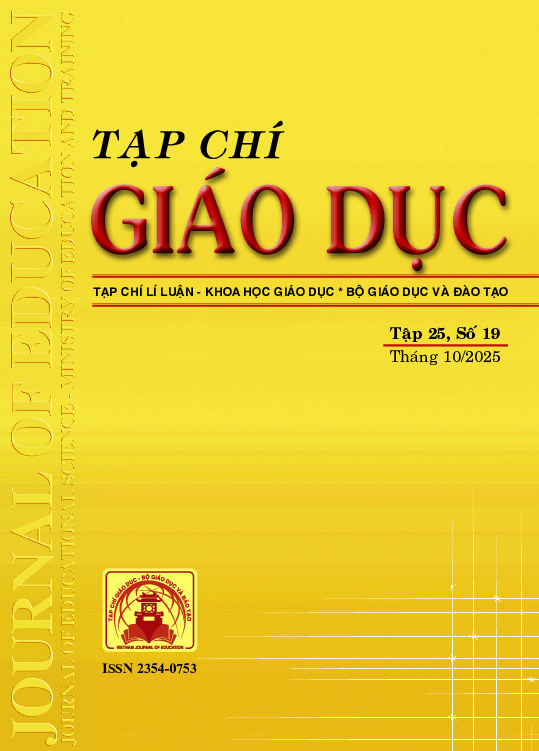Quản lí dựa trên nhà trường: Mô hình, kinh nghiệm quốc tế và đề xuất triển khai tại Việt Nam
Tóm tắt
In the context of Vietnam's comprehensive education reform guided by Resolution No. 29-NQ/TW and the 2018 General Education Curriculum, the study of the School-Based Management (SBM) model has become essential to enhance governance efficiency, strengthen school autonomy, and ensure accountability in general education institutions. Drawing from both international theories and local practical needs, SBM is considered a suitable approach to improving education quality. This study shows that the SBM model, if implemented in alignment with Vietnam’s institutional conditions and educational culture, can serve as a driving force for educational innovation. By analyzing experiences from countries such as the United States, Australia, Indonesia, Thailand, and Malaysia, alongside the Vietnamese context, the study proposes a model built on three key pillars: autonomy, accountability, and supervision. The model highlights the active involvement of principals, school councils, teachers, students, parents, and educational management agencies. The findings hold significance for both policy and practice, contributing to the refinement of school governance models and paving the way for further research into the conditions necessary for the effective implementation of SBM in Vietnam.
Tài liệu tham khảo
Arar, K., & Abu-Romi, A. (2016). School-based management: Arab education system in Israel. Journal of Educational Administration, 54(2), 191-208.
Ban Chấp hành Trung ương (2013). Nghị quyết số 29-NQ/TW ngày 04/11/2013 về đổi mới căn bản, toàn diện giáo dục và đào tạo, đáp ứng yêu cầu công nghiệp hóa, hiện đại hóa trong điều kiện kinh tế thị trường định hướng xã hội chủ nghĩa và hội nhập quốc tế.
Bandur, A., Hamsal, M., & Furinto, A. (2022). 21st Century experiences in the development of school-based management policy and practices in Indonesia. Educational Research for Policy and Practice, 21(1), 85-107.
Bộ GD-ĐT (2018). Chương trình giáo dục phổ thông - Chương trình tổng thể (ban hành kèm theo Thông tư số 32/2018/TT-BGDĐT ngày 26/12/2018 của Bộ trưởng Bộ GD-ĐT).
Bộ GD-ĐT (2020a). Thông tư số 28/2020/TT-BGDĐT ngày 04/9/2020 ban hành điều lệ trường tiểu học.
Bộ GD-ĐT (2020b). Thông tư số 32/2020/TT-BGDĐT ngày 15/9/2020 ban hành điều lệ trường trung học cơ sở, trường trung học phổ thông và trường phổ thông có nhiều cấp học.
Bruns, B., Filmer, D., & Patrinos, H. A. (2011). Making schools work: New evidence on accountability reforms. World Bank Publications.
Bùi Minh Hiền, Nguyễn Vũ Bích Hiền (2015). Quản lí và lãnh đạo nhà trường. NXB Đại học Sư phạm.
Caldwell, B. J. (2005). School-based management (Vol. 3). International Institute for Educational Planning.
Caldwell, B. J., & Spinks, J. (2007). Raising the stakes: From improvement to transformation in the reform of schools. Routledge.
Caldwell, B. J., & Spinks, J. M. (2005). Leading the self-managing school. Routledge.
Cheng, Y. C. (2022). School effectiveness and school-based management: A mechanism for development. Routledge.
Dwangu, A. M., & Mahlangu, V. P. (2021). Accountability in the financial management practices of school principals. International Journal of Educational Management, 35(7), 1504-1524.
Gurr, D. (2015). A model of successful school leadership from the international successful school principalship project. Societies, 5(1), 136-150.
Kameshwara, K. K., Shields, R., & Sandoval-Hernandez, A. (2024). Decentralisation in school management and student achievement: Evidence from India. The Journal of Development Studies, 60(1), 67-82.
Kauko, J., & Salokangas, M. (2015). The evaluation and steering of English academy schools through inspection and examinations: National visions and local practices. British Educational Research Journal, 41(6), 1108-1124.
Keddie, A., MacDonald, K., Blackmore, J., Boyask, R., Fitzgerald, S., Gavin, M., ... & Yoon, E. S. (2023). What needs to happen for school autonomy to be mobilised to create more equitable public schools and systems of education?. The Australian Educational Researcher, 50(5), 1571-1597.
Muncey, D. (2014). Guidelines for required school and central advisory committees and school site councils. Los Angeles Unified School District Policy Bulletin (July edition).
OECD (2010). PISA 2009 Results: What Makes a School Successful? Resources, Policies and Practices (Volume IV). Paris: OECD Publishing.
OECD (2016). School Leadership for Learning: Insights from TALIS 2013. Paris: OECD Publishing.
OECD-UNESCO (2016). Education in Thailand: An OECD-UNESCO Perspective. OECD Publishing.
Patrinos, H. A., & Fasih, T. (2009). Decentralized decision-making in schools: The theory and evidence on school-based management. World Bank Publications.
Shoma, H., Takayama, K., & Lingard, B. (2015). Principal leadership and school reform: a comparative study of SBM policies in Australia and Japan. Asia Pacific Journal of Education, 35(3), 302-317.
Stacey, M., Wilson, R., & McGrath-Champ, S. (2022). Triage in teaching: The nature and impact of workload in schools. Asia Pacific Journal of Education, 42(4), 772-785.
Thủ tướng Chính phủ (2024). Quyết định số 1705/QĐ-TTg ngày 31/12/2024 phê duyệt Chiến lược phát triển giáo dục đến năm 2030, tầm nhìn đến năm 2045.
Volansky, A., & Friedman, I. A. (Eds.). (2003). School-based management: An international perspective. Jerusalem: Publication Department, Ministry of Education.
Tải xuống
Đã Xuất bản
Cách trích dẫn
Số
Chuyên mục
Giấy phép

Tác phẩm này được cấp phép theo Ghi nhận tác giả của Creative Commons Giấy phép quốc tế 4.0 .












